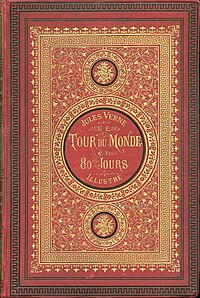

As you may or may not know, I teach drama at a summer camp. One of my responsibilities there is to write and direct the camp show at the end of each four week session. The choosing of the camp show is always a harrowing process, involving many arguments between me and camp director Sylvia. But it always works out in the end, as this summer we ended up with two wonderful, canonical, stories,
Around the World in 80 Days and
The Wizard of Oz. So, as I set out to adapt these oft-adapted tales for a 20 page, hour long, camp show, I decided to read the original (I went through a similar process last year with
Peter Pan).
Both of these stories were intended for children, at least according to Barnes and Noble, who only had the Jules Verne novel in the Young Adults Classics section (Whereas L. Frank Baum's novel got the B&N Classics treatment). While I think
Wizard of Oz will turn into a better camp show (thanks largely in part to the, on second viewing, incredibly odd and campy movie version), the book pretty much sucked. While the story is a classic, and it has some good themes, its pretty boring. Dorothy is very much a little girl, and the major characters pend most of their time repeating what they want (i want a brain! what about my courage! etc etc). All of the action scenes are short and seem like afterthoughts...Dorothy is in Oz within the first 2 pages (it takes longer in the script I wrote, and that clocks in at a double spaced 22), the witch dies five minutes after Dorothy gets there, etc. Theres no danger, no struggle, just a lot of declaiming and a few didactic lessons (though there are some cool parts that were removed from the movie, especially the china people kingdom and the men with no arms who shoot their heads at people). Overall though, the story is much better int he movie, its told with humor, verve, and, well, color that is missing in the novel.
Around the World in 80 Days, on the other hand, is dull but enjoyable. The story is also one that is fixed in our canons, but the original has some stuff to offer...there is no hot air balloon (maybe the single most iconic image from the movies)
, and the chase is actually pretty exciting...involving evil brahims straight out of
Temple of Doom, opium overdoses, and gunfights with Native Americans. Fogg is as straightlaced as they come, so when he punches a detective or proposes marriage, its an earned and enjoyable surprise, something missing from the
Wizard novelization. From the Verne books I remember, its not as captivating or groundbreaking (or prescient) but its a good yarn, nonetheless.
Both these stories are stories that we know, that we've seen, that we could largely tell without the aid of the novel. Are they worth reading anyway? Maybe in the case of
Around the World, but I'd leave the wizard to Judy Garland and Burt Lahr.

 Two massively nostalgic books from when I first started to love reading, both of which I've gone a few years since revisiting. Satisfying, breezy stuff (Westing Game's occasional weird relationship with racial identity excepted), and the Adams reminds me that I haven't reread any of his books in years. Time to restart down the diminishing-returns road of the Hitchhiker's Trilogy (sic)? Or, for that matter, to revisit Raskin's entire ouvre? PERHAPS!
Two massively nostalgic books from when I first started to love reading, both of which I've gone a few years since revisiting. Satisfying, breezy stuff (Westing Game's occasional weird relationship with racial identity excepted), and the Adams reminds me that I haven't reread any of his books in years. Time to restart down the diminishing-returns road of the Hitchhiker's Trilogy (sic)? Or, for that matter, to revisit Raskin's entire ouvre? PERHAPS!













